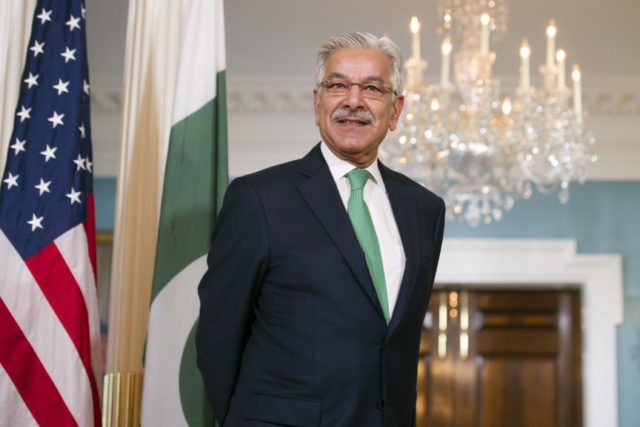American taxpayers should help Islamabad foot the bill for the fence it is constructing along Afghanistan-Pakistan border, declared the Pakistani foreign minister this week.
“It won’t cost them (Americans) much,” Foreign Minister Khawaja Asif told Bloomberg, without providing a specific figure. “The war is costing them much more.”
Currently, the United States is spending about $45 billion annually on the war in Afghanistan, which began in October 2001. The U.S. has spent about $877 billion since the war started.
Asif’s comments come as U.S. President Donald Trump’s administration is struggling to convince Democrats in Congress to pay for a wall along United States-Mexico border to reduce the number of illegal immigrants and deadly drugs flowing into the United States from Latin America.
President Trump has suspended an estimated $2 billion in funding for Islamabad over Pakistan’s refusal to take “decisive action” against jihadist groups planning attacks against U.S. troops and their allies from Pakistani soil, namely the Afghan Taliban and their Haqqani Network allies.
The Pentagon and Kabul have long accused Pakistan of harboring terrorists, something that Islamabad denies.
According to Asif, up to 70,000 people are crossing the Afghanistan-Pakistan border each day.
Referring the cross-border activity, the Pakistani foreign minister said it is a “free for all,” adding, “These issues are facilitating terrorism.”
“Any free movement from their side to our side, or our side to their side, can breed mistrust and obviously some terrorist activity on our side or on their soil,” he told Bloomberg.
Asif argued that the border fence will reduce the flow of jihadists crossing into both countries.
A report issued in October by the Afghanistan Analysts Network research group noted that there are 235 points of entry between Pakistan and Afghanistan, some frequently used by terrorists and drug traffickers.
Despite more than $8.5 billion in U.S. taxpayer funds spent on counternarcotics activities in Afghanistan since the war began, the Muslim-majority country remains the world’s top supplier of opium and heroin.
Much of the opium, the main ingredient in heroin, is smuggled out of Afghanistan through Pakistan.
“About 40 percent of [the Afghan opium and heroin] does go out through Pakistan, about 30 percent through Iran, about 30 percent through the north,” U.S. Gen. John Nicholson, the top commander of American and NATO troops in Afghanistan, told reporters in December 2017.
Notwithstanding the lack of funding, Asif predicts the Afghanistan-Pakistan fence will be constructed by 2019.
“Less than 10 percent of the fence planned along the 1,456 miles (2,343 kilometers) of mountainous border with Afghanistan has been completed so far due to financial constraints,” acknowledges Bloomberg.
Islamabad is seeking to repatriate the nearly 2 million Afghan refugees living in Pakistan. Asif urged the United States to help Islamabad sent the Afghan refugees back to their native land.
In June 2016, Sartaj Aziz, an adviser to the Pakistani prime minister on foreign affairs, argued that Afghan refugee camps on Pakistani soil are serving as “safe havens for terrorists” due to the unfettered movement of people across the border.
Asif repeated the claims when talking to Bloomberg, noting most of the estimated 600,000 Afghan refugees who went back to their home country in 2017 returned to Pakistan.
Afghanistan and Pakistan have been accusing one another of serving as a sanctuary for terrorists for years. Some border disputes between the two neighbors have triggered armed clashes.
The Afghanistan-Pakistan region is home to the “highest concentration” of U.S.-designated terrorist groups in the world, the Pentagon repeatedly stresses.
Many of those groups, notably the Taliban, al-Qaeda, the Haqqani Network, and the Islamic State (ISIS/ISIL), maintain strongholds along the Afghanistan-Pakistan border. The majority of Afghan and U.S. military casualties have taken place along the international boundary that divides Afghanistan from Pakistan.
The U.S. military has designated the Taliban and al-Qaeda-affiliated Haqqani Network as the top threat facing American troops in Afghanistan.

COMMENTS
Please let us know if you're having issues with commenting.